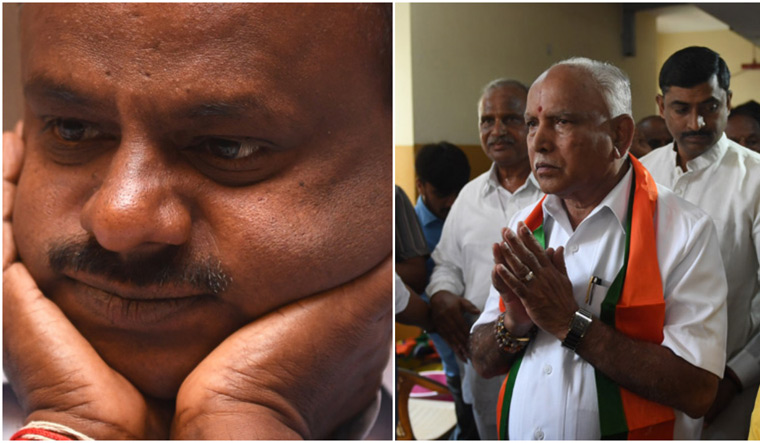With a Supreme Court bench ordering the one-day-old government of B.S. Yeddyurappa to submit to a floor test at 4pm on Saturday, the political crisis in Karnataka appears poised for a crucial turn.
B.S. Yeddyurappa was sworn in as Karnataka chief minister on Thursday by Governor Vajubhai Vala even as the Congress and JD(S) claimed they had more numbers. Vala also granted time of 15 days to Yeddyurappa to prove his majority.
The swearing-in of Yeddyurappa led a midnight hearing in the Supreme Court on the intervening night of Wednesday-Thursday. While the Supreme Court did not stall the swearing-in of Yeddyurappa, the court posed questions to the governor and BJP on how Yeddyurappa was invited to form the government.
Lawyer Abhishek Manu Singhvi, representing the JD(S)-Congress, welcomed the order of the bench comprising Justices A.K. Sikri, S.A. Bobde and Ashok Bhushan. The bench refused the request of Mukul Rohtagi, appearing on behalf of BJP MLAs, to grant more time for a floor test. The Supreme Court bench gave specific instructions on the nature of the floor test:
A pro-tem speaker would administer the oath to MLAs and decide the mode of test.
No secret ballot would be allowed.
The governor has been barred from nominating an MLA from the Anglo-Indian community till the numbers are proven.
The Yeddyurappa government has been barred from taking major policy decisions.
The state DGP has been tasked with ensuring security of all MLAs.
As both sides claim confidence ahead of a floor test, here's a look at where things stand:
The floor test, in simple terms, involves all the MLAs present standing up in the legislature to prove their support to a particular party or formation. As the state Assembly has not yet been convened and the newly elected MLAs not sworn in, the Karnataka floor test will need to be conducted by a pro-tem speaker.
The pro-tem speaker, by convention, is usually the senior-most member of the legislature. The governor appointed K.G. Bopaiah as pro-tem speaker on Friday afternoon; Bopaiah is a three-term legislator. Media reports had initially indicated Congress' R.V. Deshpande, who first entered the legislature in 1983, was being considered for the post. The pro-tem speaker administers the oath to speakers and indicates the mode of the test, such as voice vote or show of hands. In case of a tie, the pro-tem speaker is allowed to vote.
Making sense of the numbers: The Assembly on Saturday would have a strength of 221 seats even as voting was held for 222 seats on May 12. The number has dropped by one seat as H.D. Kumaraswamy of the JD(S), who won both Channapatna and Ramanagara, will only have one vote. The simple majority mark in this instance would be 111 votes.
As far as numbers go, the BJP is known to have 105 members supporting it, including one independent MLA.
Soon after the Supreme Court order on Friday, the Congress declared it had the support of a total of 117 MLAs—78 Congress, 38 JD(S) and one independent MLA.
The Congress and JD(S) shifted their MLAs to hotels in Hyderabad late on Thursday night to avoid the threat of poaching. According to sources, 113 JD(S)-Congress camp MLAs are in Hyderabad as of Friday. The MLAs are expected to return via road on Friday evening for the floor test.
Risk of 'crossovers': At least two newly elected Congress members—Anand Singh and Pratap Gowda Patil—who were previously with the BJP were reported to be missing on Thursday. Confusion persists on the status of these two legislators even though the Congress claimed Singh will support the grand old party. JD(S) leader and chief minister aspirant H.D. Kumaraswamy warned the Narendra Modi government was using the Enforcement Directorate to 'threaten' MLAs of the JD(S)-Congress to switch sides.
Another source of worry for the JD(S)-Congress is the fact that the BJP may use the 'Lingayat' card to pressure legislators from the community to vote in favour of Yeddyurappa or abstain.
Possible outcomes: While the total elected strength of the Assembly is 224 members, the floor test takes into account only those members who are present at the time. So, abstention by members of the JD(S)-Congress combine will bring down the effective strength and make it easier for the BJP to get through or vice-versa.
However, in the event of no party or formation being able to prove the requisite majority, the governor is required to convene a special Assembly session to ascertain the majority group. In the event of a stalemate persisting, experts opine the governor may resort to recommending President's Rule.


